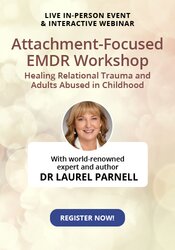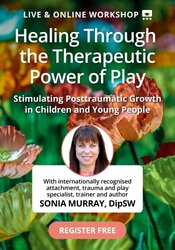Enrol in an online course today for flexible, self-paced learning—no fixed schedule required. Plus, enjoy lifetime access to course materials for convenient revisiting.
Pillars of Strength 3/8: Ways to Express Grief
24 May, 2019

One difficulty with grieving is that it is invisible. We feel as if a limb has been cut off, or that there is a huge chasm of emptiness in our heart where the person we love is missing. But when others look at us we look exactly the same.
The central paradox of grief is that we are forced, through death, to face a reality we don’t want. Often we do what we can to avoid that reality, and block the pain. The truth of the death often feels surreal initially, when we feel so shocked. As the pain begins to take hold, we may begin to use habitual behaviours to protect us against feeling. Depending on the behaviours, these can work for us, or against us.
Pain is the agent of change
This is a hard concept to help clients understand. But if we think about how we are in our everyday life, when it is going according to plan, we tend to be content, and there is no need to change anything. It is from persistent feelings of discomfort, boredom, anger, anxiety or fear that we realise we need to revaluate what is going on. Is it who we are with? Is it work? What is it that we need to change, in order to feel content, even happy again?
When someone dies this change is imposed on us, and the pain we feel is intensified, forcing us to adapt to a different external and internal world. It is the internal yell of pain that lets us really know the person we love is no longer alive. We may need to help our clients see that it is often the behaviours we use to avoid pain that actually harm us the most.
The importance of expressing grief
People usually say time is a great healer, but if we don’t do the work of grief and find ways of expressing the conflicting and confusing feelings that are inside us, they tend to stay there, unchanged, yet contaminating all our other feelings. We function ok but our capacity to feel joy is diminished, for the energy we use to block pain, blocks our capacity to feel across the spectrum of our experience. We armour ourselves against all feelings. I am sure we all recognise those clients who we feel we could tap and we’d hear the tin of their armour that is keeping us out.
My big shout in today’s blog is that we need to find ways to help our clients express their grief. In my book Grief Works, I show that the most common way is to talk. As psychotherapists well know, something happens when we focus on what is going on inside us. We find words to describe that feeling and, as we voice it, there is a connection between our words and our feelings that means incrementally we adjust a little bit more to the reality that this person has died.
For other clients, painting, gardening or making music may be just as helpful as talking to friends and family, or to us. There is no right way to express grief. The key is to help your client find a way that works for them. If they do this regularly, it becomes a supportive pillar in the management of their pain, which in itself changes over time.
Find out more about Julia’s work and writing at https://juliasamuel.co.uk/



![Ceo63b3w0uabhly4ycu3w[1]](/media/wweaj4n3/ceo63b3w0uabhly4ycu3w-1.jpg?width=410&height=410&v=1da9ffc7ac3acb0&format=webp&quality=80)














